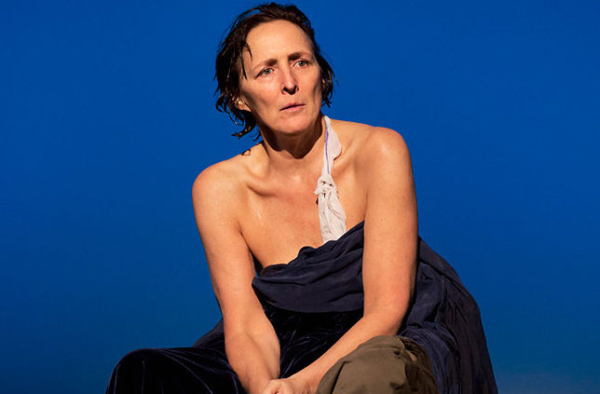The Testament of Mary (Barbican)

© Paul Kolnik
Twenty years ago, Tilda Swinton made an exhibition of herself while taking a nap in a glass box at the ICA. She repeated the performance last year in New York, shortly before Fiona Shaw sat stock still inside another glass cube as the Virgin Mary on Broadway.
Now Shaw and director Deborah Warner bring this remarkable solo show to the Barbican, and the audience is at first invited to roam about the stage as if in an art gallery, while Shaw, in traditional Madonna robes and a mask-like expression of sarcastic serenity, sits encased in glass beside a chained, unpleasant-looking vulture.
Over the next 80 minutes, the image is deconstructed, thawed in the limpid prose of Colm Tóibín (his 100-page novella was shortlisted for last year’s Man Booker prize) and the fervent performance of Shaw as a woman engulfed in the mystery of her own sadness, confused by her son’s death.
There is a cruel physical realism about Mary’s situation: she’s living under surveillance in Ephesus, in the shadow of the crucifixion, sore at the disciples and hangers-on who allowed her son to believe the sound of his own voice. She’s a side-lined mother and widow more agitated by others’ misconceptions than her own immaculate preconceptions.
She changes her clothes, moves props and furniture around, at one point strips stark naked and slips into a plunge pool, as if to escape her own story. She saw the miracles, the come-back of Lazarus, the transformation of water into wine at the wedding feast in Cana, the theatre of Pontius Pilate’s life-bartering address on the balcony, the barbaric execution.
But if such things can happen, she wants time pushed back, a life restored before her son’s death, before he left home and his father was alive. Shaw presents a woman who rejects her role as an awe-struck participant in religious ideology and wishes to reclaim her spirit and individuality, her feelings and thoughts from beneath that stone.
Her eyes are now bandaged, then not. She is desperate and forlorn in a harsh, anonymous landscape, where a huge, slender uprooted tree, a birdcage and a ladder suggest a variety of perspectives on the treadmill, the suffocating and devalued existence she’s been allocated by history and selective gospel writers.
Shaw’s performance is symphonically conceived and magisterially supported in Warner’s production, the design of Tom Pye, the merciless lighting of Jennifer Tipton and the extraordinary music and sound design of Mel Mercier. The play, like Tóibín’s prose, has a rumbling, rhythmic, devastating power, and the added dimension of this performance makes it all the more unforgettable.
The Testament of Mary continues at the Barbican until 25 May 2014










